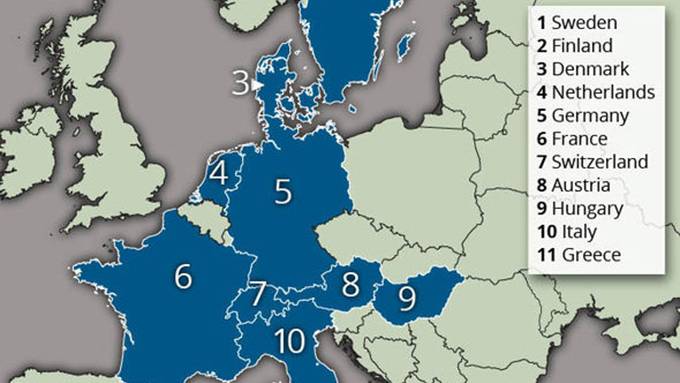March of the Far-Right Across Europe as Immigration Critics and Opposition to Extreme Left Grows
Source: express.co.uk
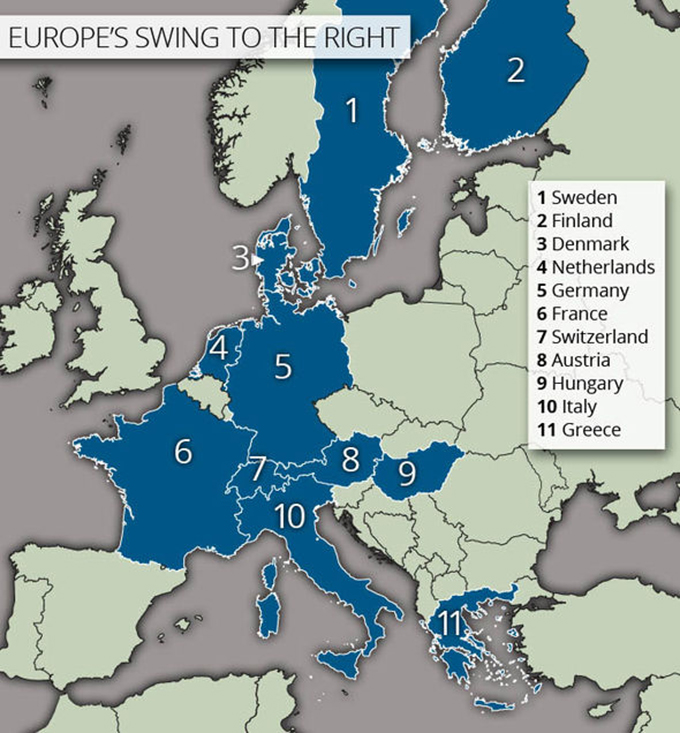
This map shows how anti-immigration campaigners have enjoyed huge gains in this year's elections, whilst thousands have taken to the streets to protest against the overwhelming influx of migrants and refugees.
From Greece to Germany and Switzerland to Sweden, far-right protestors and parties have stormed the mainstream of European politics as voters rebel against years of predominantly socialist rule.
In France Marine Le Pen's controversial Front National came within a whisker of winning control over swathes of the country, whilst the traditionally liberal societies of Scandinavia turned their backs on moderates amid unprecedented migratory pressure.
[...]
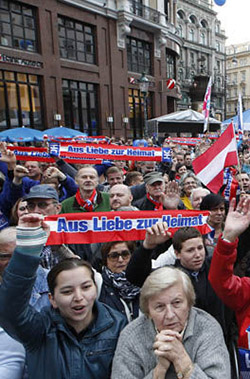 AUSTRIA: [...] (Sensible) politicians have benefited from a surge in support largely due to the ongoing migrant crisis. Austria has been overwhelmed by the flow of migrants in 2015, with hundreds of thousands of people arriving on its borders seeking passage to [...] neighbouring Germany.
AUSTRIA: [...] (Sensible) politicians have benefited from a surge in support largely due to the ongoing migrant crisis. Austria has been overwhelmed by the flow of migrants in 2015, with hundreds of thousands of people arriving on its borders seeking passage to [...] neighbouring Germany.The far-right Freedom Party (FPO) has stepped into the chaotic political vacuum that has ensued, quietly but confidently positioning itself as a protector of Austria's heritage and borders against the tide of refugees. In late September the party stormed to success in local elections, doubling its share of the vote to more than 30% and securing 18 seats in Upper Austria, second only to the ruling regional conservatives.
In early October the FPO continued its meteoric rise, giving the socialist mayor of Vienna a major scar, securing nearly a third of the vote in what is traditionally one of Europe's most liberal capitals. They have also consistently performed well in national opinion polls this year, with most carried out since May showing the far-right party in the lead - some by as many as 10 points.
The next Austrian general election will take place by the end of 2018 and the (traitorous) mainstream parties are now facing a major battle to keep the far-right FPO out of power.
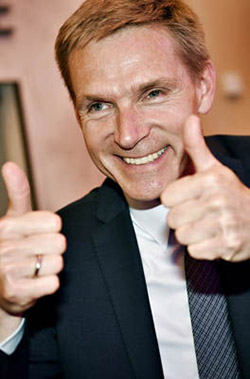 DENMARK: The far-right Danish People's Party (DF) has been so successful in recent elections that it now has the balance of power and could topple the Danish coalition government. The party finished second in June's general election after securing 21% of the vote and 37 seats in the country's 179-seat parliament.
DENMARK: The far-right Danish People's Party (DF) has been so successful in recent elections that it now has the balance of power and could topple the Danish coalition government. The party finished second in June's general election after securing 21% of the vote and 37 seats in the country's 179-seat parliament.Leader Kristian Thulesen Dahl eventually opted to form a ruling coalition with the conservatives, but has recently threatened to "topple" the government by pulling out if there is any attempt to soften its stance on immigration. The head of the deposed Social Democrats has called for a compromise over Denmark's tough immigration laws, but the DF is so powerful that now seems extremely unlikely.
The party, founded in 1995, campaigns against mass migration and multiculturalism, with former leader Pia Kjærsgaard stating that she did "not want Denmark as a multiethnic, multicultural society". In 2010 it proposed a complete ban on all immigrants from outside Europe, excluding refugees in need of shelter.
The rise of the far-right in Denmark mirrors a similar situation in other Scandinavian countries, which are sparsely populated and critics say are ill-suited to take in huge numbers of migrants from the Middle East.
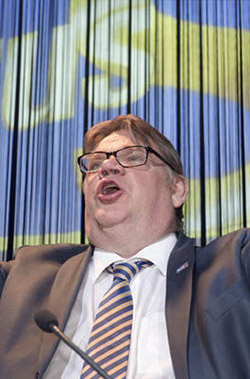 FINLAND: The Finns Party (PS) - known as the 'True Finns' - has enjoyed a meteoric rise similar to the Danish People's Party (DP) and is now a major player in Finland's coalition government. The nationalists became Finland's second largest political party when they won 17.7% of the votes in April's general election and entered into a pact with the ruling Conservatives.
FINLAND: The Finns Party (PS) - known as the 'True Finns' - has enjoyed a meteoric rise similar to the Danish People's Party (DP) and is now a major player in Finland's coalition government. The nationalists became Finland's second largest political party when they won 17.7% of the votes in April's general election and entered into a pact with the ruling Conservatives.Like the DP, the eurosceptic party espouses essentially left-wing economic policies but allied to a hardline stance on immigration. Its leadership publicly denounces racism and discrimination although comments by some of its MPs, including Teuvo Hakkarainen who used an offensive word to describe black people and mocked Islamic calls to prayer.
Founded in 1995 the PS has risen to prominence in recent years because of concerns about immigration. It made its breakthrough to become the third largest party in Finland 2011 - the same year an opinion poll revealed that 51% of its voters agreed with the statement "people of certain races are unsuited for life in a modern society".
 FRANCE: The Front National (FN) party stunned Europe and the world when it stormed to victory in the first round of the French local elections earlier this month. Led by the charismatic Marine Le Pen, daughter of its founder Jean-Marie Le Pen, the far-right party tapped into concerns about high immigration and home-grown extremism in the aftermath of the bloody massacre in Paris.
FRANCE: The Front National (FN) party stunned Europe and the world when it stormed to victory in the first round of the French local elections earlier this month. Led by the charismatic Marine Le Pen, daughter of its founder Jean-Marie Le Pen, the far-right party tapped into concerns about high immigration and home-grown extremism in the aftermath of the bloody massacre in Paris.It scooped an astonishing 28% of the national vote in the first round of the elections, polling first place in six of France's 13 administrative regions and winning more than six million votes. The party was routed in the second round of voting, but only because Francois Hollande's socialists dropped out of the running in two regions and urged their voters to back former president Nicolas Sarkozy's conservatives instead.
Such a pact between the Labour and Tory parties in the UK would be unthinkable, and underlines the desperation of moderate French politicians who have been outflanked and out-thought by the rapid rise of the FN. Despite the result political commentators have said the momentum remains behind France's far-right, and Ms Le Pen is expected to make a major push for the presidency next year.
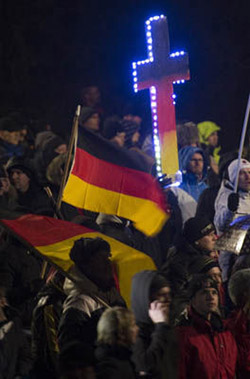 GERMANY: For decades Germany has [..] (been devoid) of far-right politics. But the recent refugee crisis, and Angela Merkel's decision to throw open the country's doors to unlimited numbers of migrants, has stoked tensions and nationalist politics could make return.
GERMANY: For decades Germany has [..] (been devoid) of far-right politics. But the recent refugee crisis, and Angela Merkel's decision to throw open the country's doors to unlimited numbers of migrants, has stoked tensions and nationalist politics could make return.Recent opinion polls suggest such concerns are not unfounded, with the right-wing Alternative für Deutschland (AfD) party making huge gains off the bank of anti asylum-seeker statements. The party - whose name means Alternative for Germany - is campaigning under the slogan "Asylum requires borders - Red card for Merkel". It scored 8% of the electorate in an opinion poll published this month, which marks a doubling in its support since September. At the same time Mrs Merkel's Christian Democrats, who have pursued a policy of demonising and denouncing right-wing and populist parties, saw their support slip from 40% to 37%.
Elsewhere the openly far-right group Pegida held one of its biggest ever rallies in Dresden in October, with 20,000 people taking to the streets to protest against immigration. The movement's attitudes towards immigrants have been repeatedly compared to those of the Nazis (oh really?), and a speaker at the Dresden rally spoke of his regret that "the concentration camps are out of action" (Yeah, if you believe in fairy tal that is).
This year has also seen a sharp rise in the number of attacks against immigrant housing, according to German charities. The Amadeu Antonio Stiftung and PRO ASYL groups compiled statistics showing that there were 429 attacks on refugee shelters up to the end of October, including 93 arson attacks, compared with 153 attacks for all of 2014.
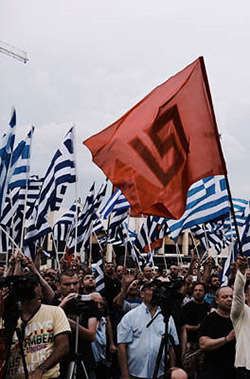 GREECE: Greek politics has become a tale of two extremes in recent years as the country battles a crushing economic depression and an overwhelming influx of migrants crossing the Mediterranean from neighbouring Turkey.
GREECE: Greek politics has become a tale of two extremes in recent years as the country battles a crushing economic depression and an overwhelming influx of migrants crossing the Mediterranean from neighbouring Turkey.Despite electing a radical socialist government Greeks have also voted in their droves for the [...] (solutions oriented) Golden Dawn party this year. The violent group was one of the biggest winners in the country's September general election, called by president Alexis Tsipras so that voters could have their say on a controversial EU bailout package.
Instead the election served to underline the growing popularity of [...] Golden Dawn, who polled third overall with more than 7% of the vote. After the result was announced its spokesman Ilias Kasidiaris, who sports a Swastika tattoo (an ancient European symbol), triumphantly declared: "Golden Dawn is a movement of power, it is not a protest movement any more."
Greek prosecutors have (falsely) accused Golden Dawn of being a criminal gang, not a political party, and most of its leaders stand accused of crimes [...] which they deny.
Ordinary Greeks have been left feeling betrayed by other European countries over a series of suffocating bailout packages, which have stopped the country's stricken economy from imploding but have also completely stifled any recovery. The country is also on the frontline of the current refugee crisis, with 7,000 migrants arriving on its shores every day. Golden Dawn, unsurprisingly, polled particularly well on the inundated islands of Lesbos and Kos and also picked up a large haul of votes in the Athens region.
With Greece's economic problems and the migrant situation unlikely to end any time soon, [...] (it's likely that) Golden Dawn could make a more serious play for power in the future.
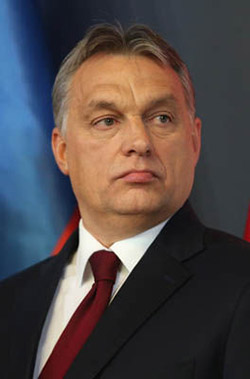 HUNGARY: Another nation feeling the extreme pressures of the migrant crisis, one in five Hungarians turned to an ultra far-right party in last year's election. The central European state, which is governed by populist right-wing president Viktor Orban, has built a huge 110 mile long fence along its border with Serbia in a desperate bid to keep hundreds of thousands of German-bound migrants out.
HUNGARY: Another nation feeling the extreme pressures of the migrant crisis, one in five Hungarians turned to an ultra far-right party in last year's election. The central European state, which is governed by populist right-wing president Viktor Orban, has built a huge 110 mile long fence along its border with Serbia in a desperate bid to keep hundreds of thousands of German-bound migrants out.But despite Mr Orban's hardline stance against immigration, 20.7% of Hungarians voted for (anti-semitic?) Jobbik in last April's general election. A year later the party won its first by-election in the country, with Lajos Rig beating Mr Orban's candidate despite sharing an article which accused the Jews of using gypsies as a "biological weapon" against native Hungarians.
The party's leader, Gabor Vona, later said: "The mood in Hungary is for a change in government, and with Jobbik, Hungary finally has the force to change the government."
Jobbik has consistently gained on Mr Orban's Fidesz party in the polls this year, and has scored as highly as 17% before dropping back to 15% in September. But the party has had a serious effect on the country's politics - it was Jobbik which suggested constructing the razor wire fence later championed by Mr Orban, and he also followed their calls to deploy the army to the border to deter migrants.
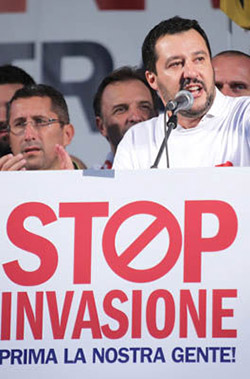 ITALY: As in Greece, Italian voters are faced with economic hardship and a place on the Mediterranean frontline of the migrant crisis. Despite being ruled by the socialist government of Matteo Renzi, it is the far-right Northern League party which has made real strides in recent elections.
ITALY: As in Greece, Italian voters are faced with economic hardship and a place on the Mediterranean frontline of the migrant crisis. Despite being ruled by the socialist government of Matteo Renzi, it is the far-right Northern League party which has made real strides in recent elections.The nationalist party, whose candidates [...] (doesn't like to have their country overrun by) gypsies and immigrants, secured its best ever results in this summer's regional elections. Standing on an anti-immigrant platform, the Northern League won the regions of Veneto - with a landslide 50% of the vote - and neighbouring Lombardy.
It also struck a humiliating blow against the ruling socialists by wooing 20% of the electorate in Tuscany, the left-wing heartland of Mr Renzi's Democratic Party. The Northern League's [...] leader, Matteo Salvini, has previously said Roma camps to be razed, called the Euro a "crime against humanity" and even accused Pope Francis of betraying Christians by promoting dialogue with Muslims.
In Veneto, his party ordered officials to clear all refugee reception centres near tourist hotspots, claiming that the the sight of African migrants was having a "devastating effect" on local traders.
Mr Salvini has emerged as the self-proclaimed leader of the country's political right, stepping into the void left by the downfall of former president Sylvio Berlusconi, and his party will be eyeing up more success when Italians next go to the polls by May 2018.
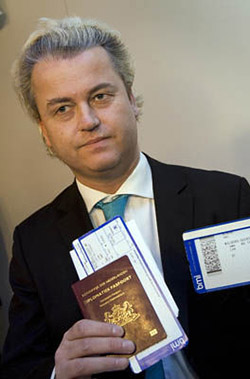 THE NETHERLANDS: Opinion polls in Holland suggest that the country's main far-right party, Party for Freedom (PVV) could be on track to storm to victory at the next general election. Support for the anti-immigration party has risen to record highs this year, with it opening up a cavernous 18 point lead on all its rivals.
THE NETHERLANDS: Opinion polls in Holland suggest that the country's main far-right party, Party for Freedom (PVV) could be on track to storm to victory at the next general election. Support for the anti-immigration party has risen to record highs this year, with it opening up a cavernous 18 point lead on all its rivals.On current predictions the eurosceptic group would win 37 seats in the Dutch parliament if there was an election tomorrow, securing around a quarter of the vote in a country known for being governed by coalition. Pollsters say that the party's popularity is growing outside its traditional working class base, with the number of graduates willing to vote for it tripling in just a few months.
The PVV is run by politician Geert Wilders, who has previously said that Europe should close its borders to Muslims and described the refugee crisis as an "Islamic invasion". More recently he has supported Donald Trump over his similar proposed policy for the United States, saying he hopes he becomes the country's next president.
Mr Wilders and his party have [...] (been tactical about) people's [...] (legitimate concerns) over a potentially huge influx of migrants and have positioned themselves as champions of traditional Dutch society. Holland, which has a population of just 17 million, is braced to take in about 60,000 asylum seekers by the end of the year.
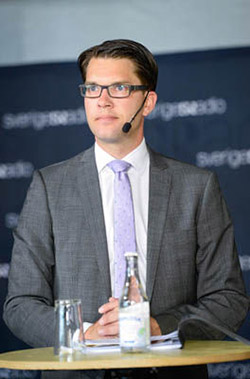 SWEDEN: Another Scandinavian country seeing a huge surge in the popularity of the far-right, once more largely brought about by the European migrant crisis. Sparsely populated Sweden, home to just 9.5 million people, will take in a record 190,000 refugees from the Middle East this year alone.
SWEDEN: Another Scandinavian country seeing a huge surge in the popularity of the far-right, once more largely brought about by the European migrant crisis. Sparsely populated Sweden, home to just 9.5 million people, will take in a record 190,000 refugees from the Middle East this year alone.Fears over how the predominantly Muslim migrants will integrate into society has seen traditionally liberal Swedes turn their backs on socialist politicians and instead embrace the anti-immigrant Swedish Democrats (SD).
The SD - which wants to close Sweden's borders to immigrants [...] - has seen a surge in support with eight separate opinion polls this year placing it as the largest party in the country. Seven of those have put its support at over 25% - comfortably ahead of the ruling Social Democratic Party.
It is already the country¹s third-largest party, with 49 representatives in parliament, following success in last year's general election and will be looking to make further gains when Swedes next head to the ballot box on 9 September, 2018.
Editor's note: We've edited out some of the hyped up baloney and garbage in this article and added additional comments in parenthesis.
Source: express.co.uk
